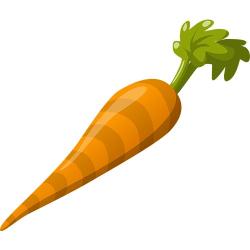Source Institutions
Source Institutions
Add to list Go to activity
Activity link broken? See if it's at the internet archive

Learners design their own experiment to determine conditions that either help or hinder the decomposition of carrots by soil microbes. They place carrots in plastic bags filled with soil (with or without added materials), then subject these bags to different conditions. Every few days, students remove the carrots from the dirt and weigh them. Depending on the experimental conditions, after a few weeks most of the carrots will have decomposed completely.
- Under 5 minutes
- 1 to 4 weeks
- $10 - $20 per group of students
- Ages 11 - 14
- Activity, Experiment/Lab Activity, Lesson/Lesson Plan
- English
Quick Guide
Materials List (per group of students)
- several triple-beam balances accurate to at least 0.1g (or electronic balances)
- 2 one-pint plastic bags with zipper closures per student
- several permanent markers (for labeling the plastic bags)
- 8-20 pounds of good quality potting soil (the most expensive you can afford)
- several garden trowels, large spoons, or plastic cups for digging and scooping soil
- 10-12 large carrots, cut into pieces about 3-4 cm long and 2-3 cm in diameter
- inexpensive watercolor paintbrushes, one or two per group, for brushing dirt from the carrots prior to weighing
- --Following materials vary depending on experiments designed--
- other types of soil (e.g., soils with high clay or sand contents, topsoil from a nearby woods, garden, or inconspicuous area of lawn, etc.)
- refrigerator space
- incubator space (instructions for a makeshift incubator included)
- several thermometers
- several small beakers, graduated cylinders
- bowls for mixing soil, or adding measured amounts of water or other substances
- safe, acidic liquid such as lemon juice or vinegar
Subjects
-
Engineering and Technology
-
Engineering
- Environmental Engineering
-
Engineering
-
Life Sciences
-
Diversity of Life
- Plants
- Viruses and Bacteria
- Protists and Fungi
-
Diversity of Life
-
Mathematics
-
Data Analysis and Probability
- Data Analysis
- Data Collection
- Data Representation
-
Measurement
- Units of Measurement
-
Data Analysis and Probability
-
The Nature of Science
-
The Scientific Process
- Asking Questions
- Conducting Investigations
- Gathering Data
- Formulating Explanations
- Communicating Results
-
The Scientific Process
Informal Categories
- Gardening
Audience
To use this activity, learners need to:
- see
- touch
Learning styles supported:
- Involves hands-on or lab activities
Other
Includes alignment to state and/or national standards:
This resource is part of:
Access Rights:
- Free access
By:
- Hebrank, Mary R.
Source Collection
- TeachEngineering
Rights:
- All rights reserved, Regents of the University of Colorado, 2013
